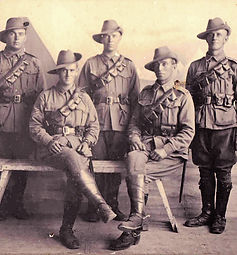Grief and Loss
The anxiety and concern of the family members of serving personnel was a commonly shared experience for women at home. Sometimes the anxiety was publicly expressed, but mostly women's concern and fears were experienced in private. Emotions were often translated into practical support for the 'boys', through involvement in organizations like the Red Cross, the Australian Comfort Funds and the many other groups.
While churches provided spiritual and emotional support, the spiritual world in secular terms became an important link for some women to their missing or deceased menfolk. This link, sometimes publicly acknowledged but more often not, was made in seances and with fortune tellers.
However, it was the knock on the door that women and family members most dreaded. The local telegram boy had the unpleasant task of delivering the news with a pink telegram. Later, a letter from an officer might inform the family of the ciricumstances of the Digger's death, but this was by no means a certainty.
Women also faced the possibility of news that their soldier was missing or wounded. Sometimes it took months or even years for a death to be confirmed, and this ignorance, often despite many letters to the Department of Defence and the Red Cross Wounded and Missing records, undermined women's support for the war. Some women preferred to believe that their brother/son was wounded and had lost his memory or perhaps had been captured as a Prisoner of War, rather than face the grim reality of death.
Many seriously wounded soldiers returned to Australia during World War I and were cared for by nurses, VADs and Red Cross workers at Rehabilitation Hospitals in the capital cities. Some of the men suffered terribly disfiguring injuries as the result of shrapnel shells exploding, and their womenfolk had to deal with the their own response to the wounds as well as the men's "shell shock", which was often very severe.
The government worked hard to acknowledge the sacrifice of the men of the AIF. Sometimes local councils provided In Memorium certificates. The British government gave (most) Australian families of deceased servicemen a commemorative medallion, known as the Dead Man’s Penny. The bronze medallion represented Britain defeating Germany. The deceased solider’s name was included, but with no rank to show equality of each man's sacrifice. The Dead Man’s Penny was accompanied by a letter from King George V, stating ‘I join with my grateful people in sending you this memorial of a brave life given for others in the Great War’. Not all soldiers' families were thrilled to receive the medallion, arguing that their son's/brother's/husband's life should be worth more than a penny, and quite a number of angry families returned the medallion to the government.

The first 5 soldiers to enlist from Stratford, Victoria, in September1914

Dead Man's Penny - Alfred Charles Mitchell, killed at Fromelles, July 1916
ANZAC Day commemorations began in 1916, and became the date of a commemoration service from that time. Local War Memorials, most often featuring a lone Digger, were erected from 1919 onwards and many women continued to grieve their whole life, laying wreaths at the Memorials to the men whose graves they would never visit. Personal commemoration included photographs of lost Diggers, a feature of many Australian homes in the 'front room' during the 1920s and beyond. Churches, even in small towns, also erected memorial tablets where funerals of Diggers became a familiar sight in the 1920s. The men's comrades provided significant support to bereaved families at the service and beyond.
Roll of Honour, Holy Trinity Anglican Church, Stratford, Victoria
Imagine you are a woman who has lost her only son in the fighting either at Gallipoli in 1915 or at Passchendaele in 1917.
You want to reply to a letter his superior officer has written to you explaining his death and commenting on the type of person he was.
It has been a month since the letter arrived, and you now feel it is time to reply.
Dear Mrs Allen
As I have been away in England wounded I only received (Miss Allen's) letter yesterday so please excuse my delay in replying.
I am extremely sorry that I am unable to give you much hope as regards your two sons. On the night of August 14th, the13th Battalion in conjunction with other regiments made an attack on that famous German stronghold Mouquet Farm. It was one of the glorious charges in which the Australians have participated as the machine gun fire which they were called upon to face was terrific. Our lads got right across but their losses were very heavy and as the regiments on our flanks failed we had to retire. We brought back a number of Germans prisoners and most of our own wounded. There was a faint possibility that your two sons were taken prisoners consequently they were posted as missing but if you have not yet received intimation that they are in German hands I think you must make up your mind that they fell gallantly while rushing forward in that glorious charge. All those that were left of the 10th reinforcements (there are very few now) were extremely sorry that the two brothers were gone. They were well liked by all ranks and were good soldiers and willing fighters. Although they have given up their lives they did their duty nobly and well. Please accept my deepest sympathy.
Yours very sincerely
T Wells, Captain
13th Battn AIF
PS. Your boys, if killed, will have been buried along with a large number of their Australian comrades on the field of battle, near Mouquet Farm, which is about a mile from Pozieres.












